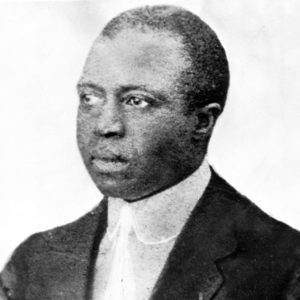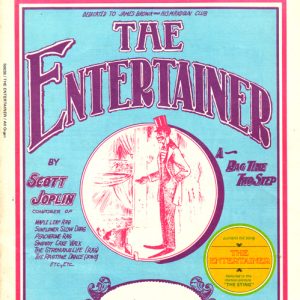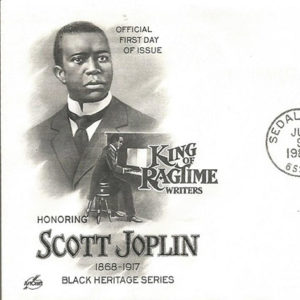calsfoundation@cals.org
Scott Joplin (1868?–1917)
Known as the “King of Ragtime,” Scott Joplin composed more than forty ragtime piano pieces, including “Maple Leaf Rag” (which sold more than a million copies) and “The Entertainer” (which was used in the 1973 film The Sting). He spent his formative years in Texarkana (Miller County), and his major opera, Treemonisha, is set in the plantation area of Rondo (Miller County) north of Texarkana.
Scott Joplin was born on November 24, 1867 or 1868, near Marshall, Texas. His father, Giles, was a former slave, and his mother, Florence, was a freed woman from Kentucky. The family moved to Texarkana early in Joplin’s life so that his father could obtain work on the railroad. Joplin showed an early interest in the piano, and he practiced in the homes where his mother did domestic work. His teachers included Mag Washington, John C. Johnson, and Julius Weiss, a German immigrant who taught him piano technique and exposed him to the European opera music that influenced his later compositions.
Joplin left Texarkana at seventeen and traveled to Texas, Louisiana, Mississippi, and various places in Arkansas. In 1885, he joined the all-night ragtime piano competitions at Tom Turpin’s Silver Dollar Saloon in St. Louis, Missouri. His rail travels took him as far as Syracuse, New York.
Joplin arrived in Sedalia, Missouri, in 1894 and played in the Williams Brothers Maple Leaf Club; his famous “Maple Leaf Rag” (1899) took on the name of that club. His moniker, “The Entertainer,” printed on the club business card, also became the name of one of his famous works. He took a music theory course at George R. Smith College in Sedalia around 1896 to learn how to notate the complicated rhythms of piano ragtime. This skill enabled his music to reach a wider audience through publication.
In 1899, John Stark, an agent for the Mason and Hamlin piano company, contracted with Joplin to publish “Maple Leaf Rag” for fifty dollars, plus royalties. Through nationwide sales at F. W. Woolworth stores, the song sold more than a million copies. This single publication freed Joplin from performing in honky-tonk saloons and enabled him to teach and compose.
Joplin married Belle Hayden in 1901, and the couple followed Stark to his new piano store in St. Louis. During this time, Alfred Ernst, conductor of the St. Louis Choral Symphonic Society, took an interest in Joplin. Encouragement from this European-trained conductor inspired Joplin to compose an opera and ballet. But his efforts resulted in little financial support from Ernst or from general audiences. A tour of his opera The Guest of Honor (1903) disbanded because of a lack of interest.
Joplin divorced his first wife in 1904. He married his second wife, Freddie Alexander, in Little Rock (Pulaski County) on June 14, 1904, but she died of pneumonia ten weeks later. Finding solace in his work, Joplin went to New York City, where Stark had opened a new piano store and publishing company.
In 1909, Joplin married Lottie Stokes. By this time, he was known as the “King of Ragtime” because he had composed more than forty successful piano ragtime numbers and had published a sheet music booklet titled School of Ragtime. Stark continued to publish Joplin’s piano works in New York, but he declined to publish Joplin’s opera Treemonisha. The opera is set in the Red River region near Rondo and tells the story of a plantation girl who fights conjurors and voodoo magic to lead her people to freedom through education. Joplin mounted an unstaged version of the opera in 1915 at the Harlem Lincoln Theater, accompanying singers at the piano. But he died of tertiary syphilis two years later, on April 1, 1917, without having seen it produced with costumes and full orchestra. He is buried in St. Michael’s Cemetery in Queen’s County, New York.
Joplin’s fame returned in the 1970s when “The Entertainer” was used in the film The Sting. Treemonisha was later performed at the Kennedy Center for the Performing Arts in Washington DC and at the Houston Grand Opera in Texas. In 1976, he was posthumously awarded the Pulitzer Prize for his contributions to American music. Joplin is a central figure in Tyehimba Jess’s 2016 poetry collection, Olio, which received the Pulitzer Prize.
For additional information:
Albrecht, Theodore. “Julius Weiss: Scott Joplin’s First Piano Teacher.” College Music Symposium 19 (Fall 1979): 89–105.
Berlin, Edward A. King of Ragtime: Scott Joplin and His Era. New York: Oxford University Press, 1994.
Blesh, Rudi, and Harriet Janis. They All Played Ragtime. New York: Oak Publications, 1971.
Curtis, Susan. Dancing to a Black Man’s Tune: A Life of Scott Joplin. Columbia: University of Missouri Press, 1994.
Ping-Robbins, Nancy R. Scott Joplin: A Guide to Research. New York: Garland Publishing, 1998.
Vanderlee, Ann, and John Vanderlee. “The Early Life of Scott Joplin.” Unpublished manuscript. Texarkana Museum of History, Texarkana, Arkansas.
Stephen Husarik
University of Arkansas at Fort Smith
 Scott Joplin Mural
Scott Joplin Mural  Scott Joplin
Scott Joplin  Scott Joplin Sheet Music
Scott Joplin Sheet Music  Scott Joplin Stamp
Scott Joplin Stamp  "Maple Leaf Rag" by Scott Joplin
"Maple Leaf Rag" by Scott Joplin 




Comments
No comments on this entry yet.